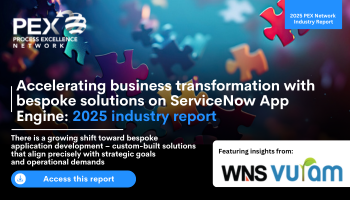Generative AI adoption soars as use cases meet or exceed expectations
More than 80 percent of generative AI use cases meet or exceed expectations with 60 percent of firms seeing business gains
Add bookmark
Generative artificial intelligence (AI) adoption soars with 95 percent of US companies now using it, up 12 percentage points in a year.
That’s according to the new Generative AI Readiness Survey by Bain & Company. It found more than 80 percent of generative AI use cases meet or exceed expectations – with 60 percent of firms seeing business gains.
Investment is also surging. AI budgets have doubled over the past year with most allocation expected to come from standard budgets.
However, scaling generative AI still poses challenges, exposing talent gaps and vendor issues with concerns about security, output quality and leadership support slowing adoption.
Join the PEX Network community

Don't miss any news, updates or insider tips from PEX Network by getting them delivered to your inbox. Sign up to our newsletter and join our community of experts.
Learn MoreGenerative AI adoption soars in production and IT
Generative AI use cases have doubled in software development/production, the survey indicates. The average number of use cases in production increased by 101 percent between October 2023 and December 2024. Meanwhile, IT is seeing the fastest growth, up 28 percentage points from the previous year.
Most use cases focus on improving productivity and reducing costs, but many also focus on top-line growth. Among companies that have scaled generative AI solutions, the vast majority say it has met or surpassed goals. Around 40 percent cite improved business results and 20 percent state that generative AI has enabled business transformation.
“Generative AI is shifting from being just an exciting technology breakthrough to becoming a real powerhouse,” commented Santhosh Vijayabaskar, director of intelligent automation and process re-engineering at an American multinational financial services corporation. “Generative AI technology enables ‘predictive process design’ where AI identifies potential bottlenecks or inefficiencies and proactively suggests improvements.”
Join us at All Access: AI in PEX 2025 to explore successfully integrating AI into process improvement initiatives
As for those disappointed with the technology, experiences differ between pilot users and those in production, according to the survey. Poor performance and data incompatibility are common frustrations. Pilot-stage companies worry more about process redesign and leadership buy-in while those further along cite low-quality vendors, which are often hard to spot early on.
Internal pressures rise as projects scale too. Output quality issues become clearer, making growth tougher than expected.
Generative AI investment is increasing
Businesses are making bigger financial and talent commitments to generative AI. Annual budgets now average around US$10 million, a 102 percent increase over February 2024 levels. More companies are integrating generative AI into standard operations, with 60 percent of programs expected to be funded through regular budget cycles.
Investment in people is scaling as well. Companies report that an average of 160 employees are now spending at least part of their time on generative AI, a 30 percent increase from just a few months ago.
What’s slowing generative AI adoption?
Despite the hype, persistent factors are slowing generative AI adoption. Companies in the early stages of adoption are more concerned about organizational readiness and related roadblocks, while those at later stages worry more about data security, privacy, quality and accuracy, Bain & Company found.
There are considerable security and leakage risks associated with generative AI use and implementation, said Lee Bogner, global AI and generative AI chief enterprise architect at Mars Inc. and PEX Network Advisory Board member. “Vulnerabilities to data leakage and cyber-attacks may come from direct prompt injections, indirect prompt injections, adversarial attacks, exploits and so-called jailbreaks.”
What’s more, 75 percent of companies are still struggling to find the in-house expertise they need across critical functions to scale generative AI across the business, the survey suggests.
“Empowering and enabling key organizational teams with hands on training on relevant AI tools and change management programs goes a long way in building trust and confidence within the AI-driven processes, thereby fostering a widespread adoption mindset,” said Apoorva Dawalbhakta, associate director (research) and strategic consultant at QKS Group.
The momentum of generative AI is undeniable. The challenge for most businesses now is not just adopting the technology but scaling it strategically, securely and with the appropriate talent.
Accelerating business transformation with bespoke solutions on ServiceNow App Engine

Today, off-the-shelf software solutions offer diverse features that enable vast opportunities to implement and maintain business transformation. However, in some circumstances, capabilities lack the flexibility and specificity required to address the unique challenges and workflows of individual organizations. As a result, there is a growing shift toward bespoke application development – custom-built solutions that align precisely with strategic goals and operational demands.
Download this report to explore how enterprises can harness the power of custom applications to drive meaningful transformation. With the growing adoption of low-code platforms like ServiceNow App Engine, organizations are building custom applications faster and with greater control. By empowering both IT professionals and citizen developers to build tailored solutions, organizations can significantly reduce time to value while maintaining control over quality and compliance.
Download Now





















